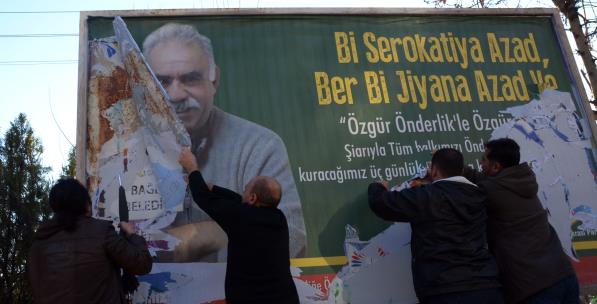Currently everyone argues that the PKK's jailed leader Abdullah Öcalan should come into play as the PKK intensifies its assaults, hoping that the conflict will end and the reconciliation process will resume. Öcalan is the name of the magic formula that is sought to rectify the PKK's strategic mistakes. There is a rumor circulating in the media that Öcalan is angry with the PKK and the Peoples' Democratic Party (HDP) as they fail to prevent conflict.
Öcalan, who is the symbolic figure of Kurdish armed nationalism, is one of those who know best how to take advantage of crises experienced in Turkish politics both on a national and regional level and of the times when such crises expand. Although Öcalan was forced to leave Syria following a longtime armed struggle and was arrested in Kenya, he has always managed to keep himself at the heart of Kurdish nationalist politics thanks to his influence on three matters. First, he has produced the discourse of the PKK's ideological transformation with every changing conjuncture. Even though the PKK took form in line with Marxist ideology during the second half of the 1970s, Öcalan impelled the organization to internalize a religious discourse as well in the 1990s. He did not refrain from using the rhetoric of civilization, which he thought to contribute to the reconciliation process in the 2010s, although it was not approved by the PKK's senior leadership. Despite all these changes in discourse, democracy has come to be the discursive theme of Kurdish nationalism. All political parties supported by the PKK and the names of these parties were formed around the assertion of democracy. Oddly enough, no one has ever questioned contradictions arising from the fact that a terrorist organization in which intra-organizational executions are so high, exalts democracy to such a great extent.
The PKK's ultimate objective has always been to ensure the integrity of Kurdistan and to bring pan-Kurdism. Even though they say that they have given up the idea of an independent state, Kurdish nationalists consider the alternative of autonomy in Turkey as an intermediate stop. They strive to unite cantons that they seized in northern Syria with the self-rule that they try to establish in southeastern Turkey.
Second, Öcalan managed to keep the PKK as a single structure, although he has been engaged in relations that are based on interests with powers such as Syria, Russia, Iran and Germany. He could manage the affiliates of these powers within the organization and thus prevented the organization from falling to pieces that conflict with each other.
Third, Öcalan is able to come to the fore as an actor when things come to an impasse. Despite power shifts experienced because of differentiations of roles between the PKK leadership in the Qandil Mountains, the HDP and Öcalan, he makes these parts work in a coordinated way as far as jail circumstances might allow. Öcalan can put forward a new strategy when he thinks that the PKK and HDP's influence goes beyond the border. More importantly, he can present himself as an actor who best supports the idea of "Türkiyelilik" (Turkey-ness, being from Turkey) and the most reasonable actor of pan-Kurdism politics. Ever since he was arrested, Öcalan has preferred to be the good cop aspect of the PKK. When he fails to have influence on the PKK leadership in the Qandil Mountains, he holds onto the excuse that an arrested leader cannot do more.
When those in the Qandil Mountains or the HDP's ambition prevails, i.e., when Öcalan makes a calculation mistake, he can settle things. He manages to make different segments say: "Fortunately, we have Öcalan." He also manages to keep the reconciliation process around himself and comes into play as a savior any time the process is put into cold storage.
The reason why Öcalan will appear on the stage once again is to bring disintegrated radical Kurdish nationalism together. He will play a part in alleviating Kurdish









